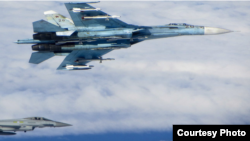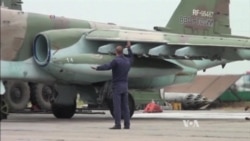Russia’s provocative military actions toward Western countries, including NATO members, is at Cold War levels and the risky strategy could prove catastrophic, according to new report.
In a report released on Monday, the European Leadership Network (ELN), a London-based think tank, gathered details of and mapped almost 40 specific incidents over the past eight months.
“These events add up to a highly disturbing picture of violations of national airspace, emergency scrambles, narrowly avoided mid-air collisions, close encounters at sea, simulated attack runs and other dangerous actions happening on a regular basis over a very wide geographical area,” write the authors of the report, entitled Dangerous Brinkmanship: Close Military Encounters Between Russia and the West in 2014.
Related TV report by Al Pessin:
Some of the incidents were labeled serious because of “aggressive or unusually provocative nature, bringing a higher level risk of escalation,” according to the report.
Three of those incidents stood out, including a near miss between a Russian surveillance plane and a civilian airliner, the abduction of an Estonian intelligence officer and the alleged appearance of a Russian submarine in Swedish waters that set off a major submarine hunt.
“What is at stake here is very profound,” said Jonathan Eyal of the Royal United Services Institute, a UK-based defense and security think tank. “What we are seeing is attempts to puncture the security guarantee, the credibility of the security guarantee, which the West has provided to former Communist nations.”
A NATO official said the report confirms patterns they have seen all year.
"So far this year, we have had over 100 separate incidents in which NATO jets have intercepted Russian aircraft," the official said in an email. "That is more than three times as many as we had during the whole of last year."
The official added that on many occasions, Russian pilots have failed to turn on their transponders or talk to civilian air traffic control and that this represents a danger to civilian aircraft.
"NATO remains vigilant and ready to respond," the official said. "In reaction to Russia’s aggression over Ukraine, we have enhanced the collective defence of our Allies. We have increased air patrols in the region. We have deployed more ships to the Baltic and the Black Seas."
They added that the "measures are entirely defensive and fully in line with NATO’s international commitments."
President Barack Obama has been adamant about defending NATO allies.
"We will defend our NATO allies, and that means every ally," he said during a visit to Estonia in September. "In this alliance, there are no old members or new members, no junior partners or senior partners. They're just allies, pure and simple."
Brian E. Carlson, a former U.S. ambassador to Latvia, says that in early 2004, when the Baltic States were entering NATO, Russia took similarly provocative actions.
He said that by April NATO and the U.S. Air Force began conducting combat air patrols (CAP).
"The Russians quit testing our resolve," he wrote in an email.
"I personally believe that these Russian actions today need a response much like [the] "broken windows" theory in New York City," he said. In essence, the theory states that by taking care of small issues, larger problems can be avoided.
While some of Russia’s actions are a throwback to the Cold War, analyst Douglas Barrie of the International Institute for Strategic Studies, a UK-based international security think tank, says Russia is not nearly as powerful as it was decades ago.
“What NATO are now faced with isn’t a Soviet-era size air force,” he said. “The Russian Air Force is significantly smaller, significantly less capable than the Soviet Air Force was in the 1980s.”
Barrie said the actions show a level of “ambition within the Russian elite.”
Still, ELN urges caution, including calling on Russia to re-evaluate its more assertive posture, calling for both sides to exercise military and political restraint and improve military-to-military communication and transparency.
“Even though direct military confrontation has been avoided so far, the mix of more aggressive Russian posturing and the readiness of Western forces to show resolve increases the risk of unintended escalation and the danger of losing control over events,” the authors wrote.
VOA’s Al Pessin contributed to this report from London.






